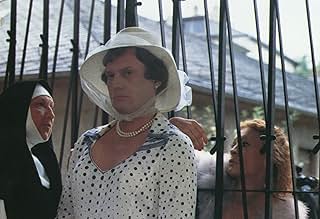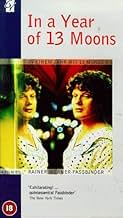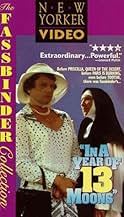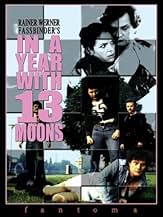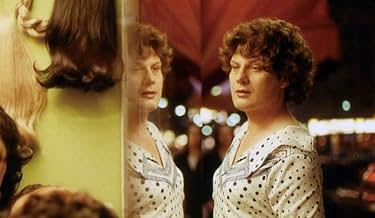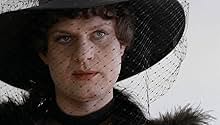VALUTAZIONE IMDb
7,3/10
5025
LA TUA VALUTAZIONE
Una donna transgender cerca di salvare qualcosa dalla sua vita confrontandosi con il suo passato angoscioso, sperando di trovare la massima accettazione tra i suoi conoscenti e se stessa.Una donna transgender cerca di salvare qualcosa dalla sua vita confrontandosi con il suo passato angoscioso, sperando di trovare la massima accettazione tra i suoi conoscenti e se stessa.Una donna transgender cerca di salvare qualcosa dalla sua vita confrontandosi con il suo passato angoscioso, sperando di trovare la massima accettazione tra i suoi conoscenti e se stessa.
- Regia
- Sceneggiatura
- Star
- Premi
- 1 vittoria in totale
Lilo Pempeit
- Schwester Gudrun
- (as Lieselotte Pempeit)
Janez Bermez
- Oskar Pleitgen
- (non citato nei titoli originali)
Rainer Werner Fassbinder
- Self
- (filmato d'archivio)
- (non citato nei titoli originali)
Günther Holzapfel
- Angestellter H. H. Brei
- (non citato nei titoli originali)
Ursula Lillig
- Putzfrau
- (non citato nei titoli originali)
Augusto Pinochet
- Self
- (filmato d'archivio)
- (non citato nei titoli originali)
Recensioni in evidenza
First of all, I would not call this a trans-or LGBT-themed film. Elvira, the main character, may have had trans surgery, but the plot makes it clear that they aren't a trans woman, that they made a mistake having the surgery. But it's also clear that the main character isn't a man, either-they are a person with a lack of identity. So it's a mistake to classify this one with the stories of trans men and women, it's about something very different.
Elvira's lack of identity surfaces in the fact that they can't remember their childhood at all, and when they search for details on it, the results are even more frustratingly ambiguous. They think that loving someone else gives them an identity, and it is this part of falling in love that they love the most-not so much being with another human being, but what it turns them into. That's why they undergo the surgery-because they think it will make them something when they are starting out as nothing. The surgery is just another turn of the screw for them-just another way of groping for an identity that isn't there. It's a much bleaker and more existential story than any trans-themed film I've ever seen.
The film leaves us with more questions than answers, which is how it should be. The characters speak in long monologues that raise lots of questions but no answers. They're more riddles than statements, and it's maddening. Maddening because the more Elvira searches for answers, the more they slip away from them. It's like a horrible taunt for Elvira, and we, in the audience, are not spared one moment of the terrible ambiguity of it all. Fassbinder's compositions add to the confusion, showing us a world that is as unclear to us as it is to Elvira.
For anyone going into this film looking for an LGBT story, you will be disappointed, as you will be if you like a story with a solid resolution. But for those who tolerate ambiguity and frustration-and, indeed, see how they can be virtues in art-you may well be dazzled and hypnotized.
Elvira's lack of identity surfaces in the fact that they can't remember their childhood at all, and when they search for details on it, the results are even more frustratingly ambiguous. They think that loving someone else gives them an identity, and it is this part of falling in love that they love the most-not so much being with another human being, but what it turns them into. That's why they undergo the surgery-because they think it will make them something when they are starting out as nothing. The surgery is just another turn of the screw for them-just another way of groping for an identity that isn't there. It's a much bleaker and more existential story than any trans-themed film I've ever seen.
The film leaves us with more questions than answers, which is how it should be. The characters speak in long monologues that raise lots of questions but no answers. They're more riddles than statements, and it's maddening. Maddening because the more Elvira searches for answers, the more they slip away from them. It's like a horrible taunt for Elvira, and we, in the audience, are not spared one moment of the terrible ambiguity of it all. Fassbinder's compositions add to the confusion, showing us a world that is as unclear to us as it is to Elvira.
For anyone going into this film looking for an LGBT story, you will be disappointed, as you will be if you like a story with a solid resolution. But for those who tolerate ambiguity and frustration-and, indeed, see how they can be virtues in art-you may well be dazzled and hypnotized.
Many, if not all of Fassbinder's films focus on weighty, emotional issues and characters plunged into personal despair, but none more so than the torturous and overpowering melodrama of In a Year of 13 Moons (1978). Here, Fassbinder created a film that is completely miserable in both tone and content from the first frame until the last; with the director taking the personal loss over the suicide of his lover Armin Meier and turning it into a suffocating chamber piece of pain and humiliation. Like his earlier masterpiece, Fox and his Friends (1975), the film focuses on the personal exploitation and persecution of a sensitive character at the hands of the people that he loves, as he finds himself cast against a cruel backdrop of the grimy and oppressive homosexual sub-culture of 1970's Frankfurt. However, unlike Fox and his Friends, the spirit of Meier's death and the guilt that we assume Fassbinder was suffering from at the time of the film's conception have here removed any prevailing notion of hope or the promise of escape that hung-over the character of Franz - the lottery winning carnival worker from the aforementioned "Fox", as he sought an end to his cruel suffering - and replaced it with a continually degrading emphasis on shame and deprivation.
Fassbinder establishes the pitiless tone of the film right from the start, with an opening vignette showing our central character, dowdy transsexual Elvira Weishaupt, dressed as a man and wandering through a park in the early hours of the morning looking for trade. After successfully managing to hook-up with a suitably butch male-prostitute, her secret is soon discovered and the 'john', alongside a couple of similarly macho friends, beat and mock Elvira, leaving her as a shivering, crying wreck, half-naked on an disused train-track. From here, Elvira limps home to her cramped apartment only to be plunged into a torturous, violent argument with her ex-boyfriend, which again, leaves her used and humiliated. The film continues in this episodic approach as we follow Elvira over the course of a few days and eventually find out more about her true character and personality and the events in her life that led to the eventual creation of the person that she is when we first discover her. These events are no less cruel and humiliating to the character of Elvira - who has clearly made a number of mistakes, either as a result of naiveté, arrogance or blind stupidity - as we discover the process that turned a handsome young man with a wife and infant daughter into an overweight, alcoholic wreck, abused and betrayed by the various men in her life, and the social pariahs that hang on the periphery.
As ever with Fassbinder, the presentation of the film underpins the feelings of the character and the world that she inhabits perfectly; with the cramped spaces of her apartment made even more prison-like and oppressive by the director's claustrophobic use of staging, design and composition. Fassbinder undertook the role of cinematographer himself here and shot the film on grainy 16mm, which again, adds to the stark and colourless feeling that the film conveys. The ugliness of the cinematography, with its dimly lit rooms, fragment composition and awkward camera movements could be seen as either amateurish on the part of the filmmaker, or as a deliberate attempt to distance the viewer from the characters and the emotional subtext in a manner that is reminiscent of Brecht; or, more appropriately, Godard's cinematic appropriation of Brecht and his theatre of alienation. As with the subsequent political satire, The Third Generation (1979) - once again, shot by Fassbinder himself - the unconventional approach to cinematography is combined with further elements that attempt to similarly disarm us and make the process of viewing the film as difficult as possible. The opening scene itself is emblematic of this approach, with Fassbinder obscuring the frame with large titles and an opening text that scrolls slowly over the entire frame before continuing with his use of obscured images and fragmented mise-en-scene.
Fassbinder also uses jarring cuts, with scenes seemingly beginning during the middle of a conversation or after the context of the scene has already been established, whilst sound and the disorientating way in which the director has characters talking over one another while music plays disconcertingly in the background all continue this idea of deconstruction and emotional distraction. The ugliness of the film fits perfectly with its tone; with the legendary scene in which Elvira and her friend wander ghost-like through an actual slaughterhouse, where cows are dispatched in graphic detail, whilst a monologue is recited to give us the entire back-story of this truly tragic figure. Whether or not Elvira is an extension of Fassbinder or the personification of Armin Meier is unknown, though there is certainly that element to the interpretation. I'd imagine that there is also some of the director in the portrayal of manipulative antagonist Anton Saitz, who recalls the depiction of Fassbinder in the director's own segment of Germany in Autumn (1978). Regardless, In a Year of 13 Moons is a fascinating if entirely difficult work from Fassbinder; one that brims with an uncomfortable feeling of personal confession and searing self examination that is grotesque, repellent and utterly draining, whilst also standing as a powerful and passionately realised piece of work that is both remarkable and affecting.
Fassbinder establishes the pitiless tone of the film right from the start, with an opening vignette showing our central character, dowdy transsexual Elvira Weishaupt, dressed as a man and wandering through a park in the early hours of the morning looking for trade. After successfully managing to hook-up with a suitably butch male-prostitute, her secret is soon discovered and the 'john', alongside a couple of similarly macho friends, beat and mock Elvira, leaving her as a shivering, crying wreck, half-naked on an disused train-track. From here, Elvira limps home to her cramped apartment only to be plunged into a torturous, violent argument with her ex-boyfriend, which again, leaves her used and humiliated. The film continues in this episodic approach as we follow Elvira over the course of a few days and eventually find out more about her true character and personality and the events in her life that led to the eventual creation of the person that she is when we first discover her. These events are no less cruel and humiliating to the character of Elvira - who has clearly made a number of mistakes, either as a result of naiveté, arrogance or blind stupidity - as we discover the process that turned a handsome young man with a wife and infant daughter into an overweight, alcoholic wreck, abused and betrayed by the various men in her life, and the social pariahs that hang on the periphery.
As ever with Fassbinder, the presentation of the film underpins the feelings of the character and the world that she inhabits perfectly; with the cramped spaces of her apartment made even more prison-like and oppressive by the director's claustrophobic use of staging, design and composition. Fassbinder undertook the role of cinematographer himself here and shot the film on grainy 16mm, which again, adds to the stark and colourless feeling that the film conveys. The ugliness of the cinematography, with its dimly lit rooms, fragment composition and awkward camera movements could be seen as either amateurish on the part of the filmmaker, or as a deliberate attempt to distance the viewer from the characters and the emotional subtext in a manner that is reminiscent of Brecht; or, more appropriately, Godard's cinematic appropriation of Brecht and his theatre of alienation. As with the subsequent political satire, The Third Generation (1979) - once again, shot by Fassbinder himself - the unconventional approach to cinematography is combined with further elements that attempt to similarly disarm us and make the process of viewing the film as difficult as possible. The opening scene itself is emblematic of this approach, with Fassbinder obscuring the frame with large titles and an opening text that scrolls slowly over the entire frame before continuing with his use of obscured images and fragmented mise-en-scene.
Fassbinder also uses jarring cuts, with scenes seemingly beginning during the middle of a conversation or after the context of the scene has already been established, whilst sound and the disorientating way in which the director has characters talking over one another while music plays disconcertingly in the background all continue this idea of deconstruction and emotional distraction. The ugliness of the film fits perfectly with its tone; with the legendary scene in which Elvira and her friend wander ghost-like through an actual slaughterhouse, where cows are dispatched in graphic detail, whilst a monologue is recited to give us the entire back-story of this truly tragic figure. Whether or not Elvira is an extension of Fassbinder or the personification of Armin Meier is unknown, though there is certainly that element to the interpretation. I'd imagine that there is also some of the director in the portrayal of manipulative antagonist Anton Saitz, who recalls the depiction of Fassbinder in the director's own segment of Germany in Autumn (1978). Regardless, In a Year of 13 Moons is a fascinating if entirely difficult work from Fassbinder; one that brims with an uncomfortable feeling of personal confession and searing self examination that is grotesque, repellent and utterly draining, whilst also standing as a powerful and passionately realised piece of work that is both remarkable and affecting.
I have to save my comments for later...I began watching this film last night and, as disturbing as the slaughterhouse scene actually is, I was only able to make it halfway through. I will return. It amazes me when a film disturbs me so much that I cannot watch it in one sitting. I had similar reactions to both Pasolini's "Salo" and to Cronenberg's "Crash".
But I'm curious to learn from anyone who might have a clue why Nino Rota's theme music from "Amarcord" (original orchestration) was put in this movie's first half and yet isn't credited on IMDb's list of "combined details".
Anybody who might offer some insight on this omission....thanks for posting it here....
But I'm curious to learn from anyone who might have a clue why Nino Rota's theme music from "Amarcord" (original orchestration) was put in this movie's first half and yet isn't credited on IMDb's list of "combined details".
Anybody who might offer some insight on this omission....thanks for posting it here....
I watched this movie and after my first reaction wasn't that clear. sometimes boring perhaps? but then i was thinking about it, more and more and it touched me more and more and in a strange way i compared this one with the all time classic x-mas movie IT'S A WONDERFUL LIFE from Capra. in the mood way. Interesting to say, that also in 13 MOONS there is an angel like in the x-mas Movie. It's the character ROTE ZORA. While Capra's angel had success, it's will know, it will not happen in 13 Moons.
of course while you will learn by the Frank Capra movie how important each human being is in the world we live in, Fassbinder gives you here the lesson how hopeless life can be. So while you have tears in your eyes by watching IT'S A WONDERFUL LIFE, you see all the hope in this movie and you know there will be a happy end. From the first second on in this movie you know, there will be no happy end. And you will have no tears in your eyes at the end, but perhaps you will be a little bit speechless. From Hollywood a movie like this never will come. This movie don't want to entertain you in a Hollywood way. so be prepared!
This movie is the most personal Fasssbinder for sure. He lost some weeks before his boyfriend. then he wrote in three days the whole script. Unbelievable to tell that he ALSO was responsible for BOOK/EDITING/CAMERA (Michael Ballhaus was asked for, but he couldn't)/PRODUCING/IDEA/EQUIPMENT and of course DIRECTING it. The Music score is very good (classic meets suicide (the new wave band) meets sixties rock'n roll meets Connie Francis). A terrific Volker Spengler as the main character as also a stunning Ingrid Caven.
Almost impossible to understand the whole plot when you have to read the English subtitles, it's absolutely recommend when you can speak German.
Beginning with the written introduction about the 13 Moons, through the slaughterhouse scene (which is remarkable for the whole movie, because here he shows us the Life and the Death, the hopeless the movie is about in a short sequence), through the next scene where elvira is lying very depressed on the bed while the record player plays a x-mas song (it's a wonderful life......), but the song has a scratch (hopeless again) to the important scene where elvira tries to become erwin again (but failed), the two hours of this movie is very sensitive. It's not a movie to watch between Forrest Gump and Star Wars (...). It's a movie which brings you back to the ground of earth. So honest that you feel pain.
Everyone will have a time in life in which he falls in a hole. This movie is showing that. A tragedy. OR a horror trip.
of course while you will learn by the Frank Capra movie how important each human being is in the world we live in, Fassbinder gives you here the lesson how hopeless life can be. So while you have tears in your eyes by watching IT'S A WONDERFUL LIFE, you see all the hope in this movie and you know there will be a happy end. From the first second on in this movie you know, there will be no happy end. And you will have no tears in your eyes at the end, but perhaps you will be a little bit speechless. From Hollywood a movie like this never will come. This movie don't want to entertain you in a Hollywood way. so be prepared!
This movie is the most personal Fasssbinder for sure. He lost some weeks before his boyfriend. then he wrote in three days the whole script. Unbelievable to tell that he ALSO was responsible for BOOK/EDITING/CAMERA (Michael Ballhaus was asked for, but he couldn't)/PRODUCING/IDEA/EQUIPMENT and of course DIRECTING it. The Music score is very good (classic meets suicide (the new wave band) meets sixties rock'n roll meets Connie Francis). A terrific Volker Spengler as the main character as also a stunning Ingrid Caven.
Almost impossible to understand the whole plot when you have to read the English subtitles, it's absolutely recommend when you can speak German.
Beginning with the written introduction about the 13 Moons, through the slaughterhouse scene (which is remarkable for the whole movie, because here he shows us the Life and the Death, the hopeless the movie is about in a short sequence), through the next scene where elvira is lying very depressed on the bed while the record player plays a x-mas song (it's a wonderful life......), but the song has a scratch (hopeless again) to the important scene where elvira tries to become erwin again (but failed), the two hours of this movie is very sensitive. It's not a movie to watch between Forrest Gump and Star Wars (...). It's a movie which brings you back to the ground of earth. So honest that you feel pain.
Everyone will have a time in life in which he falls in a hole. This movie is showing that. A tragedy. OR a horror trip.
As some others have written or implied this film is absolutely exhausting. It doesn't abandon its character or his life at any time although at times we almost WANT relief. Mahler's music in films has been dutifully noted. It can be almost as depressing in concert version. As for Nino Rota's "happy" music, or "life just continues (joyfully)" score, the irony isn't lost either. This is a one-man job and therefore takes risks that few producers or companies would tolerate under normal circumstances. I was profoundly moved by the film; I just don't plan to see it again for a while.
Curtis Stotlar
Curtis Stotlar
Lo sapevi?
- QuizThe tape-recorded narration heard throughout the film (particularly during the final scene) was not scripted. Volker Spengler (playing Elvira Weishaupt) and Rainer Werner Fassbinder recorded the narration together, with Fassbinder asking questions and Spengler responding in character. In the final cut of the film, Fassbinder's voice is edited out.
- Colonne sonoreSchöner fremder Mann
Music and Words by Athena Hosey and Hal Gordon and German lyrics by Camillo Felgen
Performed by Connie Francis
I più visti
Accedi per valutare e creare un elenco di titoli salvati per ottenere consigli personalizzati
- How long is In a Year with 13 Moons?Powered by Alexa
Dettagli
- Data di uscita
- Paese di origine
- Lingua
- Celebre anche come
- Un anno con tredici lune
- Luoghi delle riprese
- Aziende produttrici
- Vedi altri crediti dell’azienda su IMDbPro
Botteghino
- Budget
- 700.000 DEM (previsto)
- Tempo di esecuzione2 ore 4 minuti
- Mix di suoni
- Proporzioni
- 1.66 : 1
Contribuisci a questa pagina
Suggerisci una modifica o aggiungi i contenuti mancanti

Divario superiore
By what name was Un anno con 13 lune (1978) officially released in India in English?
Rispondi
